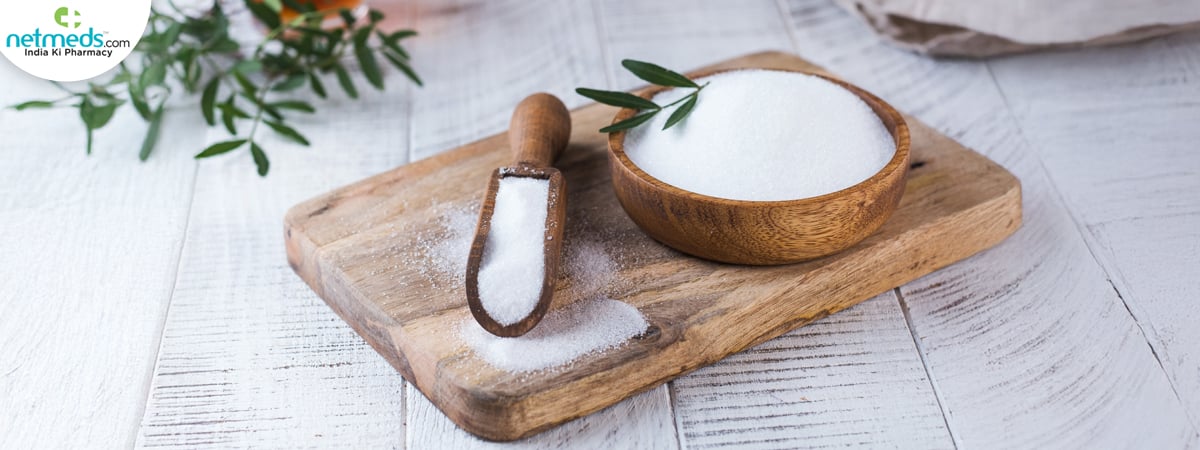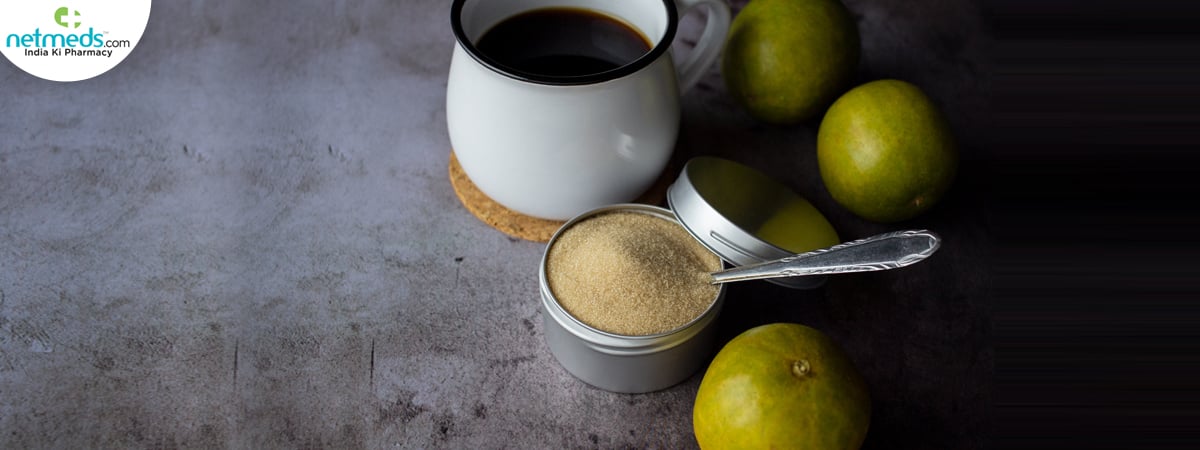Most of us love the taste of sugar. Comforting, familiar, and almost impossible to resist, especially for those with a sweet tooth. But with rising health concerns, many people are now rethinking their daily sugar intake. As a result, healthier and natural alternatives like stevia and monk fruit are becoming more popular than ever. These natural zero-calorie sweeteners offer the same sweetness without the calories or blood sugar spikes. With more people choosing mindful eating, the shift toward cleaner, natural sweeteners continues to grow. Both are plant-based, calorie-free, and safe for diabetics, making them ideal choices for a healthier lifestyle. However, we still wonder which is healthier and tastes better, stevia or monk fruit? This detailed article compares stevia vs monk fruit sweetener based on taste, health benefits, glycaemic index, and suitability for diabetics, helping you choose the best one for your daily use.
Also Read: Monk fruit/Lo Han Guo: Health Benefits, Uses, and Easy Recipe of This Tiny Melon.

What Is Stevia Sweetener?
Stevia is a sweetener derived from the leaves of the Stevia Rebaudiana plant. A natural, zero-calorie sweetener, its sweetness comes from Steviol glycosides, mainly Rebaudioside A and Stevioside, which are a hundred times sweeter than sugar. To produce stevia, the plant leaves are harvested, dried, and soaked in warm water to extract the sweet compounds. The liquid is then filtered to remove plant material. After filtration, it goes through purification using resin filters to isolate the Steviol glycosides and remove bitter components. The purified extract is finally crystallized and dried into a white powder or converted into a liquid form. While stevia comes from a natural plant, commercial products are often highly refined to achieve a clean, sugar-like taste. The resulting sweetener is non-caloric and widely used as a sugar substitute, especially by diabetics and health-conscious individuals.
Also Read: Stevia: Nutrition, Benefits, Uses, and Side Effects Of This Natural Sweetener
What Is Monk Fruit Sweetener?
Monk fruit sweetener is a natural, zero-calorie sugar substitute derived from the monk fruit, a small green melon native to China. Its intense sweetness comes from unique natural compounds called mogrosides, which can be two hundred times sweeter than sugar. To produce monk fruit sweetener, the ripe fruits are harvested, peeled, and crushed to release their juice. This juice is then filtered to remove seeds, skins, and pulp. Next, the liquid undergoes extraction and purification, where the mogrosides are separated from other components that may cause off-flavours. The purified sweet compounds are then dried and processed into a fine powder or blended into granules. Sometimes monk fruit extract is mixed with carriers like erythritol or dextrose to make it easier to measure and use like regular sugar.
Stevia Vs Monk Fruit: Which Tastes Better?
Stevia comes from the Stevia rebaudiana plant. Its active compounds, steviol glycosides, are up to a hundred times sweeter than sugar. However. It can leave a slightly bitter or liquorice-like aftertaste. Some people describe it as metallic or sharp. The taste can vary from brand to brand, depending on purity. On the other hand, monk fruit contains mogrosides, which provide intense sweetness without bitterness. It tastes cleaner and smoother. No bitter aftertaste like stevia, and it is closer to sugar in flavour profile. Monk fruit sweetener generally tastes better and more natural than stevia. This is why many premium sugar-free products use monk fruit over stevia.
Also Read: Artificial Sweeteners: 5 Healthy Sugar Substitutes You Can Include In Your Daily Diet
Which Is Healthier, Stevia Or Monk Fruit?
While both are considered safe, natural, and calorie-free, they offer different health advantages in the following ways:
Stevia Health Profile
· Zero calories
· Plant-derived
· Shown to help reduce blood sugar spikes
· Contains antioxidants
· May help reduce blood pressure in some individuals
Monk Fruit Health Profile
· Zero calories
· Over 200 times sweeter than sugar
· Contains powerful antioxidants called mogrosides
· Anti-inflammatory properties
· May support insulin sensitivity
· No effect on blood sugar levels
Stevia Vs Monk Fruit Sweetener: Key Health Benefits
Below are the major health benefits of comparing stevia and monk fruit to help you choose the best one for your daily routine.
· Both help control blood sugar levels. Neither stevia nor monk fruit increases blood glucose
· They are safe for diabetics and those managing insulin resistance
· Stevia improves glucose tolerance and lowers post-meal sugar spikes. Monk fruit, too, has zero impact on blood sugar and may improve insulin function
·Both sweeteners contain zero calories, making them excellent for weight loss, intermittent fasting, keto diet, and low-carb lifestyles
· Since they allow you to enjoy sweetness without adding calories, they help reduce overall sugar intake and curb sugar cravings
· Stevia contains steviol glycosides, which have antioxidant and anti-inflammatory properties, while monk fruit contains mogrosides, which are even more potent antioxidants linked to anti-fatigue effects.
Also Read: Type 2 Diabetes Mellitus: Causes, Symptom,s And Treatment

Which Should You Choose Between Stevia And Monk Fruit
Choose stevia if you want a widely available, budget-friendly sweetener and you don’t mind a slight aftertaste. Go for monk fruit if you want extra research-backed safety, the best taste, no bitterness, and you prefer the strongest antioxidant benefits. Monk fruit is slightly healthier because of its antioxidant-rich mogrosides and cleaner taste profile, with no known digestive side effects. However, stevia is also an excellent, well-researched natural alternative and is good to go as a sweeter, cleaner option for daily use.
Conclusion
In conclusion, both stevia and monk fruit sweeteners offer natural, zero-calorie alternatives to sugar with minimal impact on blood sugar levels, making them popular choices for diabetics and health-conscious individuals. While they are generally safe, some people may experience mild digestive discomfort, especially when these sweeteners are blended with sugar alcohols like erythritol. Pure forms of both tend to be well-tolerated, though stevia may occasionally cause a slight aftertaste and monk fruit may be too intensely sweet for some. Overall, when consumed in moderation, both sweeteners provide clean, natural sweetness with far fewer risks compared to regular sugar. Although the fruit itself is natural, commercial sweeteners are often highly refined to produce a clean, sugar-like sweetness. The final sweeteners are though widely popular among diabetics and health-conscious consumers due to their zero glycaemic impact and natural origin.
(This article is reviewed by M Sowmya Binu Health And Nutrition Expert)
Author Profile: Preeti Sharma:
Preeti Sharma has a Master's in Electronic Media and Mass Communication and a short-term writing certification from Florida. With close to a decade of experience, she specializes in crafting engaging blogs on beauty, veterinary care, and healthy cooking. Preeti is proficient in video editing tools and produces captivating and informative content across multiple platforms.
References:
Natural sweetener Stevia rebaudiana: Functionalities, health benefits and potential risks
Victoria Peteliuk , Lesia Rybchuk
https://pmc.ncbi.nlm.nih.gov/articles/PMC8600158/
https://www.researchgate.net/publication/40448347_Stevia_Stevia_rebaudiana_a_bio-sweetener_A_review
Safety of use of Monk fruit extract as a food additive in different food categories
https://pmc.ncbi.nlm.nih.gov/articles/PMC7008860/



 Previous
Previous